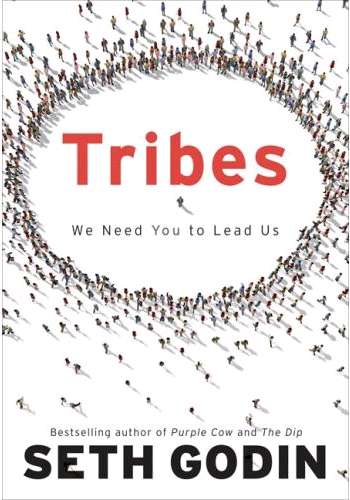
He is the author of 10 bestselling books. His books have been translated into more than 25 languages. He’s the number 1 business blogger in the world. Seth Godin’s new book Tribes is all about leadership and getting things done. And it includes a case study on the No Kill movement.
In his new book, Godin says “Sure, you know about superstars like Steve Jobs, Barack Obama and John Mayer. But consider: NATHAN WINOGRAD [who is saving] the lives of millions of dogs and cats with his tenacious opposition to their slaughter by animal shelters.”
Here’s a review of the book by Guy Gonzalez at Loud Poet:
Just do it.
Or, as Gandhi put it, “Be the change you wish to see in the world.”
That, in a nutshell, is the primary message of Tribes: We Need You to Lead Us, Seth Godin’s masterful mini-manifesto on what it takes to be a leader and why YOU should be the one to take the lead.
“I can tell you this: leaders have nothing in common.
They don’t share gender or income level or geography. There’s no gene, no schooling, no parentage, no profession. In other words, leaders aren’t born. I’m sure of it.
Actually, they do have one thing in common. Every tribe leader I’ve ever met shares one thing: the decision to lead.”
Emphasis mine, but it’s a point Godin returns to several times throughout the book, illustrating it with numerous examples of people from various walks of modern life who didn’t take no for an answer: they rejected the status quo, risked failure to achieve success by being deeply committed to what they believed in, attracted like-minded people to their cause as a result, and led them forward.
“All you need to do is motivate people who choose to follow you:
This leads to an interesting thought: you get to choose the tribe you will lead.
Through your actions as a leader, you attract a tribe that wants to follow you. That tribe has a worldview that matches the message you’re sending.”
Through the wide range of instructive and/or inspirational examples he cites, from the requisite Steve Jobs and Starbucks, to the far more interesting Grateful Dead and Nathan Winograd — he even throws in a nod to Barack Obama, although unnamed, in a brief section sub-titled “Criticizing Hope is Easy” — Godin gets in front of almost every likely objection someone might have for why his premise doesn’t apply to them and knocks them down.
One of the clearest, and most timely, examples he offers is that of Fox News, noting that they “didn’t persuade millions of people to become conservatives, they just assembled the tribe and led them where they were already headed.” (Ultimately off a cliff, it would seem, but that’s a different post!)
Clocking in at a brisk 147 pages — of which I specifically dog-eared and marked up more than twenty — Tribes reads like a dizzying rush of adrenalized common sense; you can almost imagine Godin pounded it out over one long, inspired, most likely caffeinated weekend. It’s neither a dry how-to manual nor cliched motivational tract, but rather an enthusiastic endorsement of standing up and taking the initiative.
If you’re already a leader, you’ll recognize yourself in these pages and find comfort in the examples of others like you. If you think you’re not leadership material, you may be surprised to realize that you most certainly could be.
Alternatively, if you only THINK you’re a leader but are really just a manager, I hope you have thick skin and can accept constructive criticism, because in a lot of ways, this book is especially for you.
Godin believes that what most often keeps someone from becoming a leader is the fear of failure, and while he arguably downplays the legitimate fear of losing one’s job (especially in the current economy), the more likely downside of taking the lead and failing is feeling bad about that failure, so his underlying philosophy is sound: leaders are modern-day heretics and they don’t burn heretics at the stake any more.
In the end, Godin encourages anyone who gets something from his book to pass on their copy to someone else. The marketing guru that he is, I’m pretty sure he figured it was more likely that anyone who was excited by his book would mark it up and hold on to it for future inspiration, and instead encourage others to buy and devour their own copy.
And that’s exactly what I’m doing.
Well played, Mr. Godin. Well played.